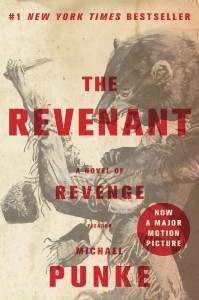 Having enjoyed the movie, “The Revenant,” I was excited to read the book, especially after hearing that the novel was extremely good in its own right. Michael Punke’s The Revenant is indeed a very good book and a great story. I suppose my problem is in having seen the film version first. When you see a movie version before reading a book version it is very hard not to spend the entire time subconsciously contrasting and comparing the two or trying not to eisegete the images and scenes of the film into the book. Even then, my problem was only with resisting those kinds of dynamics and not with the book itself. The book is great. It is significantly different from the movie. If you have not seen the movie but intend to do so, you might want to stop reading here. There will be spoilers.
Having enjoyed the movie, “The Revenant,” I was excited to read the book, especially after hearing that the novel was extremely good in its own right. Michael Punke’s The Revenant is indeed a very good book and a great story. I suppose my problem is in having seen the film version first. When you see a movie version before reading a book version it is very hard not to spend the entire time subconsciously contrasting and comparing the two or trying not to eisegete the images and scenes of the film into the book. Even then, my problem was only with resisting those kinds of dynamics and not with the book itself. The book is great. It is significantly different from the movie. If you have not seen the movie but intend to do so, you might want to stop reading here. There will be spoilers.
The story itself is actually fairly straightforward. While on an expedition for the Rocky Mountain Fur Company, a band of trappers and fur traders are set upon by hostile Native Americans. The survivors are making their way through the Western wilderness of the early 1800s when their guide, Hugh Glass, is viciously mauled by a bear. Captain Harris leaves behind two men to care for and bury Glass once his seemingly inevitable death arrives. Ultimately, however, Fitzgerald and Bridger, the two men left behind with Glass, rob him and abandon him for dead, though Fitzgerald is the main antagonist here. The rest of the story involves Hugh Glass’ attempt to find the two men and seek revenge for the theft.
As for the differences, the movie was, of course, much more “Hollywoodized” than the book. There is no doomed romance in the book, no haunting slain love, no Native American child, and, most significantly, no ultimate reckoning with Fitzgerald. In the movie, Hugh Glass kills Fitzgerald (or floats him down to his death, to be more accurate) and never lays a finger on Bridger. In the book, Glass beats Bridger to a bloody pulp but never kills Fitzgerald (though he does try). The book ends with a courtroom drama gone awry and not with a Native American war party looking down with some modicum of understanding upon the avenged Hugh Glass. There is essentially no mystical relationship between Glass and the Native Americans in the book.
In the book, when Glass finally gives voice to his grievance, he surprisingly reveals that he does not fault the men for the abandonment but he does fault them for stealing his rifle, knife, steel, and flint. The movie had to concoct the death of Glass’ son at the hands of Fitzgerald to make the quest more primal and visceral. There is something profoundly anticlimactic in the idea of the whole story being essentially about a rifle, though, in the book itself, it seems clear enough that being abandoned for dead surely must be driving Glass as well.
The book takes a welcome philosophical and even theological turn as Glass ultimately has to come to terms with his inability to obtain the justice he desires. In a powerful scene, Glass asks himself how he can possibly just turn and walk away from Fitzgerald without getting his ultimate revenge. As he asks this, he finds himself looking up in the night sky at The Northern Cross constellation. Without overplaying the scene, Punke seems to be suggesting that Glass abandons his obsessive desire for revenge as he is staring at the cross in the sky. It is, again, a powerful scene. I am not suggesting that Glass has anything like a conversion (or that he does not), but I will say that Christian readers will be struck by the poignancy of this moment. It is a refreshing note of transcendence and a much needed one.
In all, the movie and book are different enough to be almost different stories. In the movie, revenge is exacted. In the book, revenge is ultimately abandoned. I very much appreciated the philosophical nuance of the novel and its grappling with the human problem of revenge. There is something strangely profound about Glass noticing Fitzgerald’s initials on his rifle once it is reclaimed. It is almost as if Punke is trying to say not only that we never get all the justice we think we are entitled to in this life, but we forever bear the painful and reminding marks of the injustices we endure on the lives we try to rebuild.
As I think about it, there is no grappling over this issue in the movie at all. The viewer simply roots Glass on toward Fitzgerald’s final reckoning with his justly deserved fate. Punke subtitled his book, “A Novel of Revenge,” and this is significant. The book leaves the reader with interesting questions of justice, vengeance, and the nature of the universe itself. The movie is a revenge story plain as simple, as beautiful and moving as it was.
You should probably see the movie. You should definitely read the book.
